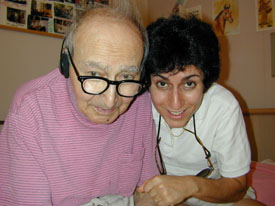This edition of caregiver articles includes experts of updated guidelines for Alzheimer’s, the forecasted doubling of dementia diagnoses in the next 40 years, supportive marriages resulting in better caregiving outcomes, and therapeutic lying.
Therapeutic Lying to Comfort a Loved One with Dementia

Most of us are taught that lying is wrong. Yet, for a person with dementia who does not remember that his wife died years ago, having to relive the (repeated) discovery of her death can prove torturously painful. Instead, focus attention on a happy memory that will divert attention away from reality or tell a therapeutic lie. This way, both of you will have a reason to smile.
Updated Guidelines for Alzheimer’s, Dementia Diagnosis
Alzheimer’s disease experts updated their diagnosis guidelines for the first time in more than 20 years, laying out how family doctors and brain specialists can best detect dementia. The guidelines call for the use of three general criteria to assess a person’s brain health. According to a report published in the journal Alzheimer’s & Dementia, two of the three guidelines include overall level of cognitive impairment and specific symptoms.
US Dementia Cases Projected to Double within 40 Years
New research shows that the “number of US adults who will develop dementia each year is projected to increase from approximately 514,000 in 2020 to about 1 million in 2060.” Additionally, the lifetime risk of developing dementia after age 55 is estimated at 42%.” Beyond women being diagnosed more frequently than men, the “relative growth in dementia cases is particularly pronounced for Black adults.”
The above article was among those in the final issue of American Society on Aging’s Generations SmartBrief.
Supportive Marriages are Crucial for Dementia Caregivers’ Well-Being
“A new Rice University study sheds light on the critical role marital relationships play in the mental and physical health of caregivers for spouses living with dementia, revealing that caregiver mental health dramatically improves when caregivers feel supported, understood and appreciated by their loved ones requiring care.” Medical Express summarizes this study recently published in Elsevier’s Comprehensive Psychoneuroendocrinology.
The Caregiver’s Voice learned of the above article from Take Care!, Caregiver Action Network’s newsletter.








